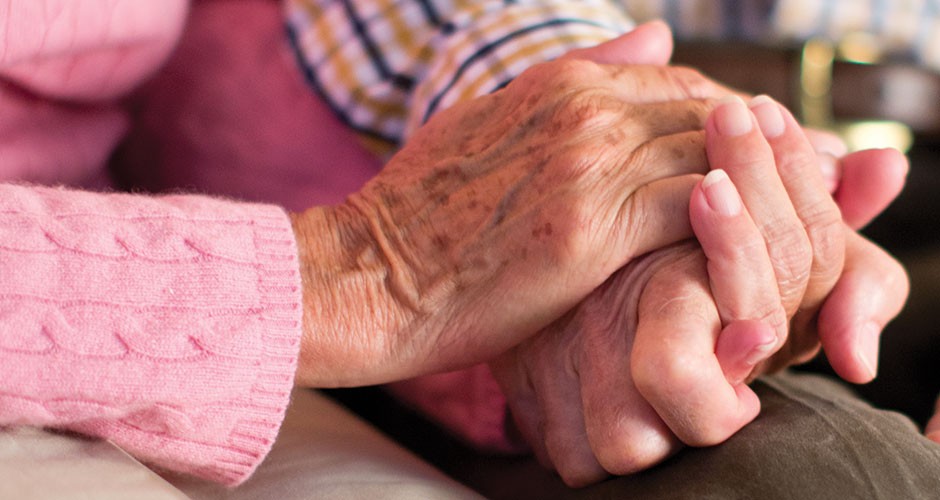Cathy Rosch’s relationship with her husband, George, shifted when he suffered a traumatic brain injury and she became his caregiver. She’s learned some valuable lessons about adjusting to change in their relationship.
Here are Cathy’s seven tips for other couples facing similar situations.
1. Let yourself grieve.
“The hardest part was that we had so many things to deal with. We had two cars and because he wasn’t able to drive, it was sitting in the garage. One of my co-workers said I should get rid of it because it was costing me money, but getting rid of it meant another loss. It was hard for me watching him lose so many things he loved, like camping. He had to rebuild his life.”
2. Make the best of the situation.
“From what I learned about brain injuries, personality changes are a big thing. He could have either turned into this wild man or this very insecure person with childlike emotions. And he got the childlike emotions. I remember thinking that one was the better of the two if I had to make a choice. We tried to lead a normal life and keep it calm because too much craziness would upset him.”
3. Help your partner—and others—understand their new limits.
“He threw a temper tantrum in our doctor’s office, and we all knew what was going on, but I was so embarrassed. Yet, I knew he couldn’t help it. They wanted more from him than what he could give.
“I had to work when he was able to finally come home, but letting him stay by himself was going to be hard because there were so many things he didn’t know anymore. I had to make notes to set out. He had to have somebody come in and help him shower.”
4. Seek champions to support your spouse.
“He had one rehab therapist he really kind of grasped onto and felt very secure with. During his progress meetings, he had to make sure I was on one side of him and his occupational therapist was on the other side. Then he could proceed.
“I found in talking to my friends and other people, that it was helpful and somewhat insightful because I could gain some tips and tricks.”
5. Express frustration, but not out loud.
“I can’t tell you how many times at night we go through what’s going to be on TV. And sometimes it’s again within 10 seconds. And I just want to go ‘Really? You’re just pulling my leg; I know you are because we just talked about this.’ But I can’t say that to him. That’s just not right, but I’m thinking it. I can think a lot of things, but my actions have to be different.
“I experienced caregiver burnout, but I was worried about him so much that I couldn’t stay away very long.”
6. Wander between worlds if needed, but with support.
“We went through a time where he was pulling away from me. We saw a therapist, and I said, ‘He is in a totally different world now.’ I had to either learn how to live in his world or live in my own world.
“At first, the relationship was really different. The emotional connection was not so much husband and wife. As time went on, it went back to husband and wife.”
7. Find release in your other roles.
“For me, work became a separate entity. I used to feel so guilty about that, but it was my way of letting my stress out. With respite care services, I knew I could go to work and know that George was OK while I was gone, which gave me peace of mind.”
Caregiving role reversed
Several years after his traumatic brain injury, George became Cathy’s caregiver when she developed an infection that led to a leg amputation.
“I had to rebuild my own life and without George, I could never have done this,” says Cathy. “We have always said through the years, ‘You would do it for me.’ And as of today, I still am doing it for him. When he gets stressed, his short-term memory gets fuzzy so I continue to help. All my needs from him are much more physical. We’re helping each other as best we can.”
When Cathy settled at home after her surgery, she fell and broke her leg and needed months of rehab therapy.
“Going home wasn’t an option. I couldn’t safely do it any longer,” says Cathy. “We went to assisted living. We have a two-bedroom unit and this is our home now.”
The couple lives at The Lodge of New Hope, which is connected to the Good Samaritan Society – Ambassador long-term care center in New Hope, Minnesota. They are grateful for the care they each received at the transitional care unit at Ambassador.
Services from Good Samaritan
When your loved one experiences a sudden health issue or is living with symptoms from chronic illness or pain, it can feel overwhelming. Good Samaritan offers a multitude of services that can help, including in-home options for support, as well as rehab therapy, assisted living and long-term care.
Not sure where to start? Respite care at Good Samaritan provides your loved one with 24-hour support during a short-term stay and allows you the time and space to plan next steps. You can find care at Good Samaritan no matter how much assistance your loved one may need. Many of our locations provide a variety of caregiver support services.




